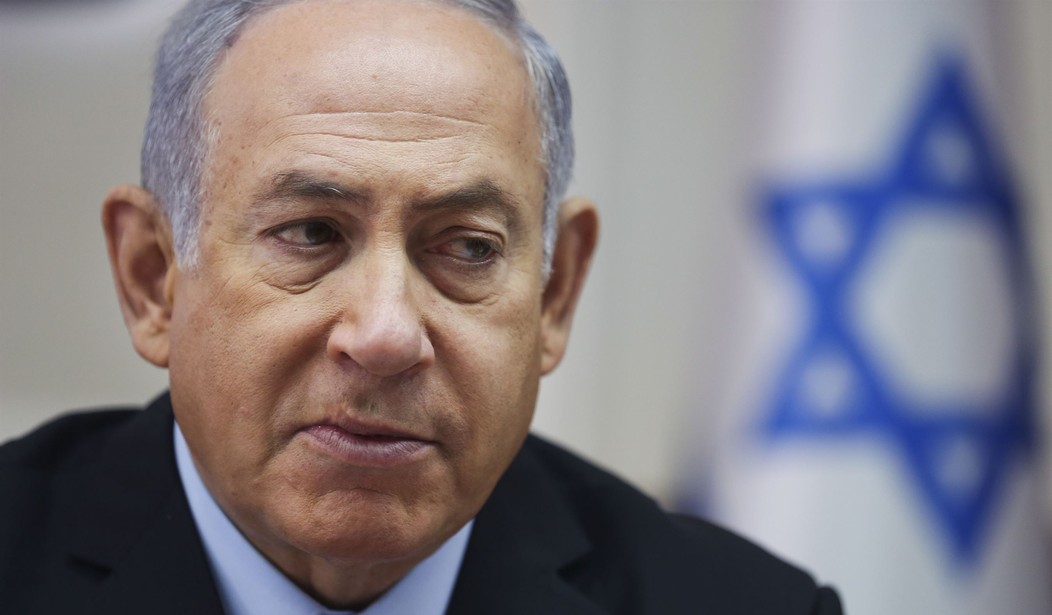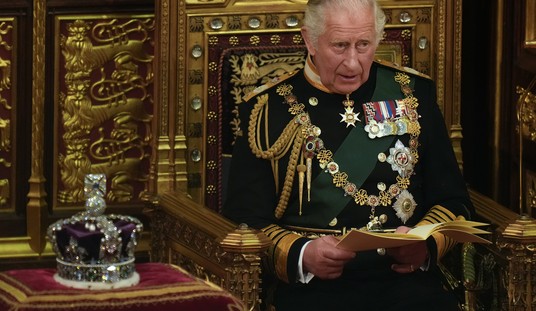Perhaps this time, the oft-promised cease-fire deal may actually happen — although whether it’s a good idea is another matter. Jazz wrote earlier that Hamas’ chief Ismail Haniyeh had publicly claimed to have accepted a deal crafted by Qatar that would see some hostages exchanged for prisoners held by Israel along with a cease-fire over several days. It sounded much like the leaks from the White House published in American media, none of which ever came to fruition.
Today, however, Israeli media report that the unity government in Jerusalem has given significant indications of movement. For the first time, Benjamin Netanyahu spoke publicly about a deal coming together soon, albeit tersely, after weeks of rebutting such rumors:
Prime Minister Benjamin Netanyahu said on Tuesday that “we are making progress” regarding the return of the hostages held by Hamas.
“I won’t exaggerate with words, but I hope there will be good news soon. We will restore security to both the north and the south. I thank all the soldiers from the bottom of my heart,” he said while speaking with IDF soldiers.
Almost immediately afterward, Netanyahu’s war cabinet scheduled a meeting to discuss these “developments.” The Times of Israel reports that the meeting will include a vote on the deal that Haniyeh endorsed earlier, after the “security cabinet” votes on it first:
The cabinet is set to convene at 8 p.m. today “in light of the developments regarding the release of our hostages,” the Prime Minister’s Office says.
Multiple outlets are reporting that officials are meeting to give final approval for a hostage release deal with Hamas.
Prior to that 8 p.m. meeting, the war cabinet and security cabinet will meet to okay the deal as well.
That meeting will take place in less than two hours, if it sticks to the schedule. Jerusalem is seven hours ahead of Eastern Standard Time, so watch for updates at or after 1 pm ET. Netanyahu’s partner in the unity government, Defense Minister Yoav Gallant, offered another broad signal a couple of hours ago that a deal is coming soon:
“We are moving step by step toward the total defeat of Hamas and getting closer to bringing the hostages home,” says Gallant following an assessment with military officials at the Gaza Division base in southern Israel.
“I think we will all have to make difficult, important decisions in the coming days,” he says. “There is not a moment throughout this campaign — 45 days — that I don’t think about the hostages,” Gallant adds.
So the deal will be “difficult,” but what specifically does it entail? According to the Jerusalem Post’s sources, it looks unfavorable toward Israel, although not nearly as bad as the Gilad Shalit swap:
The proposed agreement involved the release of approximately 50 Israeli children and their mothers in exchange for a four-day ceasefire. It will take place in a 1:3 format, three Palestinian prisoners for each hostage.
Under the terms of the deal, Hamas has committed to locating the remaining children and mothers. In return, Israel has agreed to release women and minors from Israeli prisons who were involved in acts of terror.
Additionally, both parties are expected to confirm the provision of fuel and monetary assistance in the Gaza Strip. …
According to the report, the ceasefire has the potential to be extended to allow for the release of more hostages. Should a temporary ceasefire be reached, the IDF would stop flying surveillance drones for six hours daily over Gaza.
Hamas insisted on the drone cessation, other reports specify, so that Israel can’t track where they’re holding other hostages. Of course, that also allows Hamas terrorists to redeploy without being tracked, which will put IDF forces at risk in hostile territory. But that’s not the worst part of the deal; the 1:3 ratio will keep the incentives in place for future hostaging, for one thing, although not at the 1:1000 premium paid in the Shalit swap. It also allows Hamas to call time-outs in the future by using the remaining hostages as bargaining chips for periods of rearming and redeployment. It plays directly into Hamas’ strategy for exhausting Israel and its diplomatic support by using its human shields to the greatest effect.
At least one key member of the unity government has already become a dissenter. National Security Minister Itamar Ben-Gvir has openly ripped the Netanyahu-led government over the “disaster” of this deal and the “idiocy” of pursuing it:
Speaking to Channel 14 on Tuesday, the minister, who heads the far-right Otzma Yehudit party, addressed the reports that Israel is close to finalizing a deal that would see some 50 people — most likely mothers and children — freed from Gaza, where they have been held for over six weeks along with some 190 others.
“I am very upset because they’re now talking about some kind of deal,” Ben Gvir, who is a security cabinet minister, told the news outlet. “I am disturbed because we are once again being divided and once again we are not being told the truth. And once again, we are being pushed to the side. The rumors are that the State of Israel is once again going to make a very, very big mistake in the style of the Shalit deal.”
“You remember that we released Gilad Shalit, we let out [Yahya] Sinwar and his friends and brought this trouble upon ourselves,” Ben Gvir added. …
“There is another thing, and that’s the concept that guides the war cabinet… they talked about a deal of 80 [hostages], dropped it to 70, then dropped it to 50,” Ben Gvir said. “They said they wouldn’t let food enter, then after that, they said they wouldn’t let fuel enter, and now they have fuel.”
If anything, Ben-Gvir may be a little too gracious in that last quote. Originally, after forming a unity government, Netanyahu demanded nothing less than the release of all hostages in exchange for nothing more than aid in the form of water, food, and medicine. It’s a very large climbdown from that to an agreement to send three Palestinian convicts for every one hostage, plus grounding drones and delivery of not just the above aid but also fuel that Hamas routinely intercepts and uses for its rockets. Small wonder that “unity” has begun to fray as this deal develops, assuming Netanyahu accepts it.
On the other hand, one deal may be enough to keep Israel’s diplomatic support going, and this one isn’t so bad that it puts Israel at much added risk. It’s not just Hamas that may need extensions for the fight in this war, after all. Joe Biden desperately needs to take some credit for a cease-fire within his party, and Israel has to keep the Abraham Accords nations on its side too, if Israel wants continued military assistance to keep this conflict as contained as it has been thus far. We can bet that those pressures have escalated in recent days, and this might help alleviate them.
International pressure is only one part of it. Netanyahu may need to produce some hostages for domestic political support too, as the demand for freeing hostages through negotiations has continued to grow. The IDF will take more losses in the next weeks and months, and that will have a corrosive impact on domestic support for the war at some point. Netanyahu may be betting that Hamas will violate the terms soon enough to discredit the idea of follow-on cease fires. In the meantime, Netanyahu will establish for both domestic and international audiences that Israel was prepared to be reasonable and rational — before the next and more destructive phases of the war begin.
If this is truly a one-off, it may be worth it. If this develops into a pattern, however, then Hamas will win and nothing will have changed except the landscape.








Join the conversation as a VIP Member